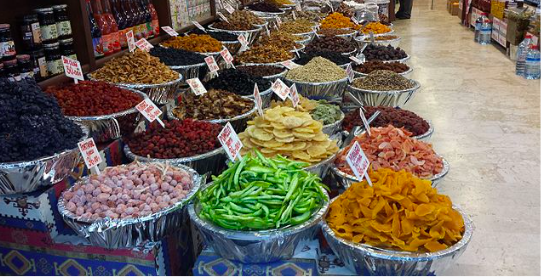The Middle Eastern Market- A Culinary Adventure in Your Backyard

By: Blanche Shaheen/Arab America Contributing Writer
Ethnic supermarkets offer a treasure trove of culinary delights and cultural experiences without the need for a plane ticket. Beyond merely being places to purchase groceries, these vibrant hubs serve as gateways to diverse cultures, allowing shoppers to explore a world of flavors, traditions, and ingredients. One of the foremost advantages of Arab markets in particular is the unparalleled variety of authentic products often unavailable in mainstream stores, from hand rolled maftoul or couscous to fresh batches of za’atar at a fraction of the price of supermarkets.
Additionally, these supermarkets foster a sense of community, providing a familiar environment where individuals from the same cultural background can connect, share stories, and celebrate their heritage. Shopping at ethnic supermarkets can be an educational experience, offering insights into different cuisines, cooking techniques, and cultural practices. Overall, these establishments enrich the culinary landscape, promoting inclusivity and appreciation for cultural diversity.
Middle Eastern markets possess a unique blend of tradition and cultural dynamics that distinguish them from other global markets. Rooted deeply in centuries-old trade routes, these markets reflect a rich tapestry of historical influences, from the Silk Road to maritime trade routes, fostering a diverse array of goods and commodities. From exotic spices and grains to delicacies prepared by Arab families using centuries old recipes, these markets offer plenty of inspiration and adventures for your tastebuds.
Even with the modernization and availability of big box stores and sleek malls, traditional Middle Eastern “dukans,” or markets still thrive, offering a juxtaposition of old and new. To navigate an ethnic market in your neighborhood, begin by embracing the atmosphere, and immerse yourself in the vibrant colors, aromatic spices, and bustling energy. For some tips to start your ethnic market adventure, click on the video below:
Additional Tips For Navigating Middle Eastern Markets
- Engage with the Arab vendors; as they often have valuable knowledge and recommendations. Ask them about unfamiliar ingredients, and their origins and uses. They love sharing their hospitality, so don’t be shy!
- Don’t be afraid to try new things. If there is a new ingredient you want to try, google a recipe on your phone using that ingredient to give you ideas on how to use it once you get home
- Oftentimes several companies compete to make the same item, from tahini and za’atar to pickled vegetables and falafel mixes. To pick the best one, buy the items that are free of fillers, seed oils, and artificial flavors and colors
- Whether you’re looking for vegan, gluten-free or halal options, Arab supermarkets have a wide range of products to suit your dietary needs. Ask the vendor if they have special sections for these dietary products.
- Arab supermarkets often offer fresh, in-season produce that is locally sourced. Some unique produce to look out for include: Persian cucumbers, fresh grape or jute (molokhia) leaves, Mexican (Magna Hybrid) squash for mahshi, cactus fruit, mulberries, and fresh mint at a bargain
- Nut mixes from the middle east are a fun addition to your diet. Be sure they are free of MSG and any artificial flavorings.
- If you are into unique beverages, look out for rare teas made of flowers and herbs like hibiscus, sage, anise. Coffees from Yemen make great gifts, and are more powerful if you want a mega caffeine boost to start your day. Other options include Vimto, a juice of grapes, raspberries and blackcurrants, flavored with herbs and spices.
- If you want to get unique alcohols, you can try Palestinian Taybeh beer, Palestinian Cremisan wines, from a winery in Bethlehem that has been around since the time of Jesus, or Arak, a potent distilled spirit with a strong alcohol flavor, and a very present anise taste.
- Some ethnic supermarkets may not accept credit cards, so it’s always a good idea to bring cash just in case.
- These markets also offer a plethora of exotic kitchen gadgets, from ornate glass tea cups, coffee pots, or serving trays.
Blanche Shaheen is the author of the cookbook called “Feast In the Middle East, a Journey of Family and Cuisine” which you can order here: https://secure.mybookorders.com/mbo_index.php?isbn=9781545675113 She is also a journalist, and host of the popular cooking show called Feast in the Middle East. She specializes in Arab cuisine of the Levant and beyond. You can check out her cooking video tutorials at https://www.youtube.com/user/blanchetv Her recipes can also be found at https://feastinthemiddleeast.wordpress.com/








